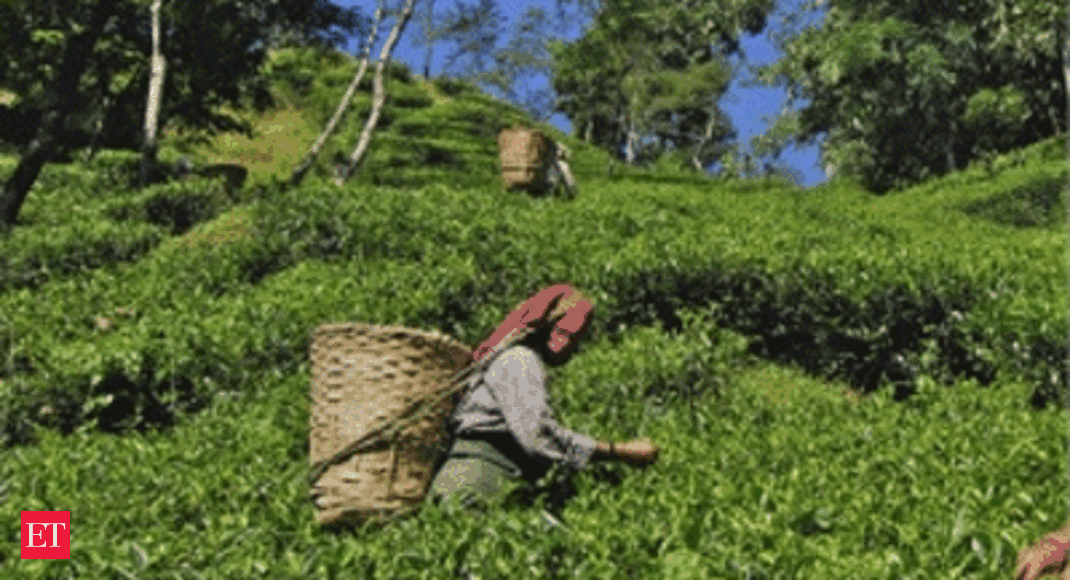Darjeeling Tea: Examining The Threats To Production

Table of Contents
Climate Change and its Impact on Darjeeling Tea Production
The delicate ecosystem supporting Darjeeling tea production is highly susceptible to climate change. The region's unique microclimate, crucial for the tea's distinctive character, is rapidly shifting, jeopardizing both the quality and quantity of the harvest.
Shifting Temperatures and Rainfall Patterns
Rising global temperatures are disrupting the delicate balance necessary for optimal Darjeeling tea growth. The ideal temperature range for tea cultivation is narrow, and even slight increases can significantly impact the tea plant's physiology and productivity.
- Rising temperatures are leading to earlier bud bursts, shortening the plucking season and affecting the quality of the leaves.
- Erratic rainfall patterns result in unpredictable yields, with both droughts and excessive rainfall causing damage to tea bushes.
- Changes in monsoon season intensity and duration are further destabilizing the delicate balance of the ecosystem, impacting both the quantity and quality of the harvest.
- Increased frequency of extreme weather events, such as hailstorms and droughts, poses a significant threat to Darjeeling tea production, causing extensive damage to plantations.
Pest and Disease Infestation
Warmer temperatures and altered rainfall patterns create favorable conditions for the proliferation of pests and diseases. This increased susceptibility to blight, fungal infections, and other infestations damages tea bushes, significantly reducing yields.
- The warmer climate is extending the breeding seasons of numerous pests, increasing their destructive potential.
- Increased humidity levels favor the development of various fungal diseases, leading to crop losses and impacting tea quality.
- The need for increased pesticide use to combat these threats raises concerns about environmental impact and consumer health, potentially undermining the organic and sustainable image of Darjeeling tea.
Socio-Economic Challenges Facing Darjeeling Tea Farmers
Beyond the environmental pressures, Darjeeling tea production faces significant socio-economic challenges, impacting the livelihoods of farmers and the sustainability of the industry.
Low Profit Margins and Fair Pricing
Fluctuating global tea prices, coupled with competition from cheaper mass-produced teas, create significant challenges for Darjeeling tea farmers. Many struggle to earn a sustainable income, leading to economic hardship and threatening the long-term viability of their farms.
- The lack of price stability makes long-term investment and planning difficult for farmers.
- Competition from larger tea producers with lower production costs pushes down prices, squeezing profit margins.
- Limited access to fair trade markets and a lack of robust price support mechanisms leave many farmers vulnerable to exploitation.
Labor Shortages and Aging Workforce
The Darjeeling tea industry faces a growing labor shortage, as younger generations migrate to urban areas in search of better employment opportunities. This leaves an aging workforce struggling to maintain efficient tea production.
- The lack of skilled labor impacts the quality and quantity of tea produced.
- The demanding nature of tea cultivation and processing makes it difficult to attract and retain younger workers.
- Investing in training and development programs to attract and upskill a new generation of tea workers is crucial for the future of the industry.
Environmental Degradation and Sustainable Practices
Unsustainable agricultural practices have contributed to environmental degradation in the Darjeeling tea growing region, impacting the long-term sustainability of tea production.
Deforestation and Soil Erosion
Unsustainable land-use practices, including deforestation and poor soil management, have led to soil erosion and degradation, negatively affecting tea plant health and productivity.
- Deforestation reduces biodiversity and diminishes the ecosystem services essential for tea cultivation.
- Soil erosion depletes the soil's nutrients, reducing tea yields and impacting the quality of the tea.
- Investing in reforestation initiatives and implementing sustainable soil conservation techniques are crucial for maintaining the long-term health of the tea plantations.
Water Scarcity and Water Management
Decreased rainfall and increased water demand are stressing water resources in the Darjeeling region, further threatening tea production.
- Climate change is exacerbating water scarcity, affecting the availability of water for irrigation.
- Efficient irrigation systems and water conservation strategies are urgently needed to ensure sustainable water use.
- Sustainable water management practices are essential to mitigate the impacts of climate change on Darjeeling tea production.
Conclusion
The future of Darjeeling tea production hinges on addressing the complex web of threats it faces. Climate change, socio-economic challenges, and environmental degradation pose significant risks to this iconic beverage. To secure the legacy of Darjeeling tea production, a collaborative effort is needed involving government intervention, fair trade initiatives, sustainable agricultural practices, and investment in research and development. By working together, we can ensure the continued production of high-quality Darjeeling tea for generations to come. Let's safeguard the future of Darjeeling tea production and its unique cultural heritage.

Featured Posts
-
 Exploring Angelina Censoris Instagram Biancas Sisters Online Presence
May 04, 2025
Exploring Angelina Censoris Instagram Biancas Sisters Online Presence
May 04, 2025 -
 Canelo Alvarez Briefly Comments On Jake Paul And Rivals
May 04, 2025
Canelo Alvarez Briefly Comments On Jake Paul And Rivals
May 04, 2025 -
 Decoding Anna Kendricks Body Language A Lively Interview Analysis
May 04, 2025
Decoding Anna Kendricks Body Language A Lively Interview Analysis
May 04, 2025 -
 Shopify Developers React To The New Annual Revenue Share Program
May 04, 2025
Shopify Developers React To The New Annual Revenue Share Program
May 04, 2025 -
 Nolan Speaks Out Addressing Allegations Made Against Charlie Dixon
May 04, 2025
Nolan Speaks Out Addressing Allegations Made Against Charlie Dixon
May 04, 2025
